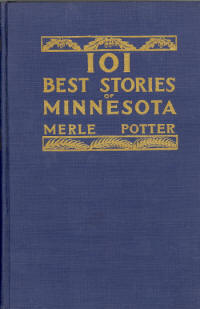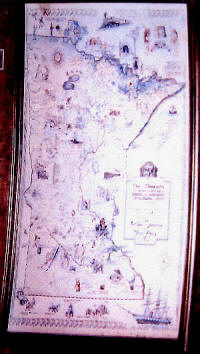| |
The Park Rapids Saloon Raid
Merle A. Potter
101 Best Stories of Minnesota
December 28, 1909 was a dour day for Park Rapids. The townsmen were
still flushed with the spirit of Christmas and were making
preparations for the gaiety of a happy New Year.
But there was no happy New Year in Park Rapids, or if there was, it
was might well repressed. There was no wine or wassail that year. ‘
Pussyfoot’ Johnson was responsible for the blight. Although some of
the good citizens of the town stood by and applauded the work.
This was long before W. E Johnson, representative of the Anti -
Saloon League had lost one of his eyes in an effort to dry up the
British Isles. He had, however, acquired the nickname of ‘
Pussyfoot’ down in Oklahoma, when he had an encounter with a
poolroom proprietor suspected of selling liquor. The fellow had
boasted that he would shoot the enforcement officer on sight. The
latter, disguised as a drunken cattleman, went into the pool room to
by a drink. Threatening to fight when he was offered sarsaparilla,
he induced the owner of the place to bring out a bottle of whisky,
whereupon Johnson overpowered and arrested the lawbreaker. An
Oklahoma paper, in giving an account of the incident , said ” the
booze buster “ strikes like lightning, even if he is a “ pussyfoot.”
|
Click on the thumbnail to bring up the full-sized
picture

Cover of Potter’s local bestseller, 101 Best Stories of
Minnesota.
--Stefanowicz |
His exploits against liquor brought him into such prominence that
Theodore Roosevelt appointed him as special officer to enforce anti
liquor laws in the Indian territories and reservations. In the
course of his duties, “ Pussyfoot “’ was sent to Minnesota, where,
it was said, the liquor laws were being violated on the White Earth
Reservation. At that time there were sixteen flourishing saloons,
one for every hundred persons in Park Rapids, all dong a good
business, enjoying prosperity along with popularity, little
realizing that disaster was just around the corner.
A short time before, the Indians of the reservation had been granted
the right to dispose of their lands and timber by the government. As
soon as the red men collected the money from their sales, they
struck out for the nearest rum shop, and it wasn’t long before they
were drunk. There was plenty of evidence that the Indians were being
defrauded, being induced to dispose of their land and timber for a
few quarts to drink. It was a nasty situation, and many of their
families were in absolute want.
Representatives of the government came out to the reservation,
investigated and came to the conclusion that the only remedy was to
enforce the old Indian treaty of 1855, which had been permitted to
lie un - enforced for years and made the selling of liquor to the
wards of the government a hazardous offense. The center of the
Indian trade was the territory about Cass Lake, Walker and Bemidji
and there the officers struck first. In the spring of 1909 an
agreement was reached with the saloon keepers of Bemidji by which no
liquor was to be sold to the Indians. Cass Lake and Walker were each
allowed to operate only two saloons.
|
Click on the thumbnail to bring up the full-sized
picture

The once famous and now missing illuminated map based on
Merle Potter’s book, last seen in a faculty lounge at the
University of Minnesota just prior to remodeling. Hopefully
it hangs in someone’s basement and will be returned to the
public one day.
--Dawes Potter |
When the thirsty braves found that they could no longer exchange
their timber and lands for firewater at these three towns, they
turned in droves toward Park Rapids as an alcoholic oasis, where
their desires were greedily gratified by the wet goods traffickers.
As a consequence, Park Rapids became the headquarters for their
drunken orgies. The Park Rapids Enterprise and the Hubbard County
Clipper published editorials condemning the practice, and letters of
protest were hurried to Washington.
It was then that “Pussyfoot ” was assigned to the job. He struck
with his accustomed fury and thoroughness. On December 2, 1909, he
issued an order that called attention to the Law of 1855, the
penalties for violation were cited, and a solemn warning sounded
that unless there was compliance, there would be trouble for sixty
saloons. The grog dealers were instructed to move their stocks from
Park Rapids by December 27. The saloon keepers were inclined to
fight. They called on their congressman, enlisted the aid of the
brewers and distillers, pulled strings, wrote petitions and called
meetings of citizens. It was no use. The order meant what it said.
Along came December 28, and the bars were still open in defiance of
“ Pussyfoot “ Johnson and all of his edicts. The morning started off
very quietly. The barkeeps were on the job serving up Tom and Jerrys,
John Collins and other jovial concoctions about as usual when a
catastrophe came riding in on the noon train, The cars had hardly
come to a complete stop when a swarm of enforcement officer, led by
“ Pussyfoot “ very much in person began leaving the train by every
exit. They started a parade up the main street of Park Rapids,
entered the first saloon, took change with ceremony and over the
vehement protests of the owner, began stacking the bottled goods up
in the street. Neatly arrayed in rows, the choice beverages were
soon smashed to bits, and liquor literally flowed down the streets
of the town.
Return to Merle Potter
|
|